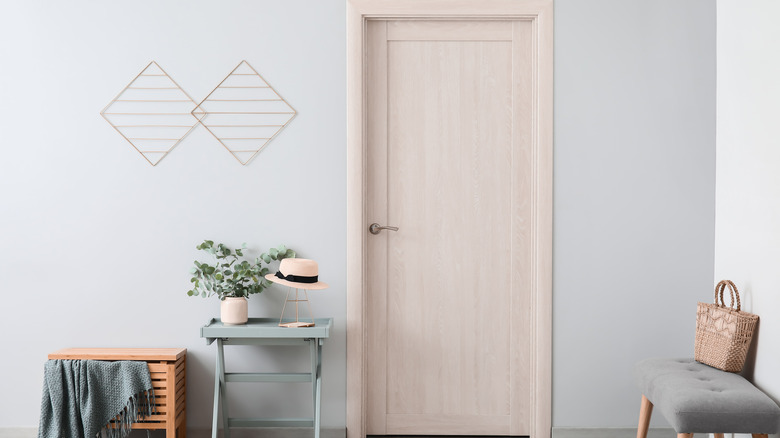How To Give Your Hollow Core Door A Luxurious Herringbone Look On A Budget
Homes both new and old often suffer from boring or outdated doors. This often overlooked element is as much a part of any space as its walls and trim, but doors are often an afterthought. In newer builds, they can be the same builder-grade paneled doors in every house on the block. In older homes, especially those built in the mid-to-late 20th century, they can be outdated and flat hollow core doors that lack any detail at all. While you can combat this by replacing your doors with custom ones, it can be expensive, to replace every door in every room. Blogger Beth Hunter at Home Stories A-Z recently unveiled how she created a custom DIY herringbone pattern door from simple wood wall paneling, strong adhesive, and paint. The stunning result completely transforms the two side-by-side raised panel doors, elevating the entire space.
While similar custom wood doors can cost anywhere from $350-$975, this easy DIY can be done for under $70 using a door you already own. Using this approach and replacing the hardware on an existing door can make it look like you've spent much more than you have. The herringbone pattern evokes classic European wood floors and chic wood furniture of a bygone era, making it a perfect choice to make even the newest doors look far older. This wood paneling works great on doors, whether you are going for a patterned look of a herringbone or just vertical panels for a more rural cottage look.
Creating a herringbone door
To create the herringbone door pattern, Beth Hunter begins by using Lowes' Unfinished Wall Planking. With tongue and grooves already cut in the panels, it is easy to assemble into a clean fit. Hunter removes the door from its hinges and places it flat, drawing a chalk line exactly down the center which will serve as a placement guide. Cut the required lengths of wood with a chop saw, measuring as you move along the door and leaving a little bit of overhang at the edges.
Once placed, begin gluing them down with a strong adhesive like Loctite. Depending on the underlying door recessed bits, it may be more difficult to get a firm grip everywhere, but Hunter advises weighing it down with heavy materials (you can also use clamps.). Once it has dried (anywhere from 12-24 hours) trim the excess wood away from the edges with a jig saw then sand for a smooth finish. You can also do a variation using simple plywood planks.
You can either finish the wood paneling with a stain or use a primer and your favorite paint shade — she chooses Sherwin-Williams Sea Salt, a soft watery green, for a coastal vibe. For modern farmhouse style, paint the doors in a soft gray or a deep black, which will stand out in neutral-driven decor. For a traditional or industrial-chic room, opt for a rich dark or medium wood finish. Leave it light for a Scandanavian-inspired look.
